The Independent's journalism is supported by our readers. When you purchase through links on our site, we may earn commission.
Best long-range electric cars 2025: Top 10 EVs that go the distance
Range anxiety is becoming a thing of the past. Newer battery tech means the best EVs can reach 300 or even 400 miles on a single charge
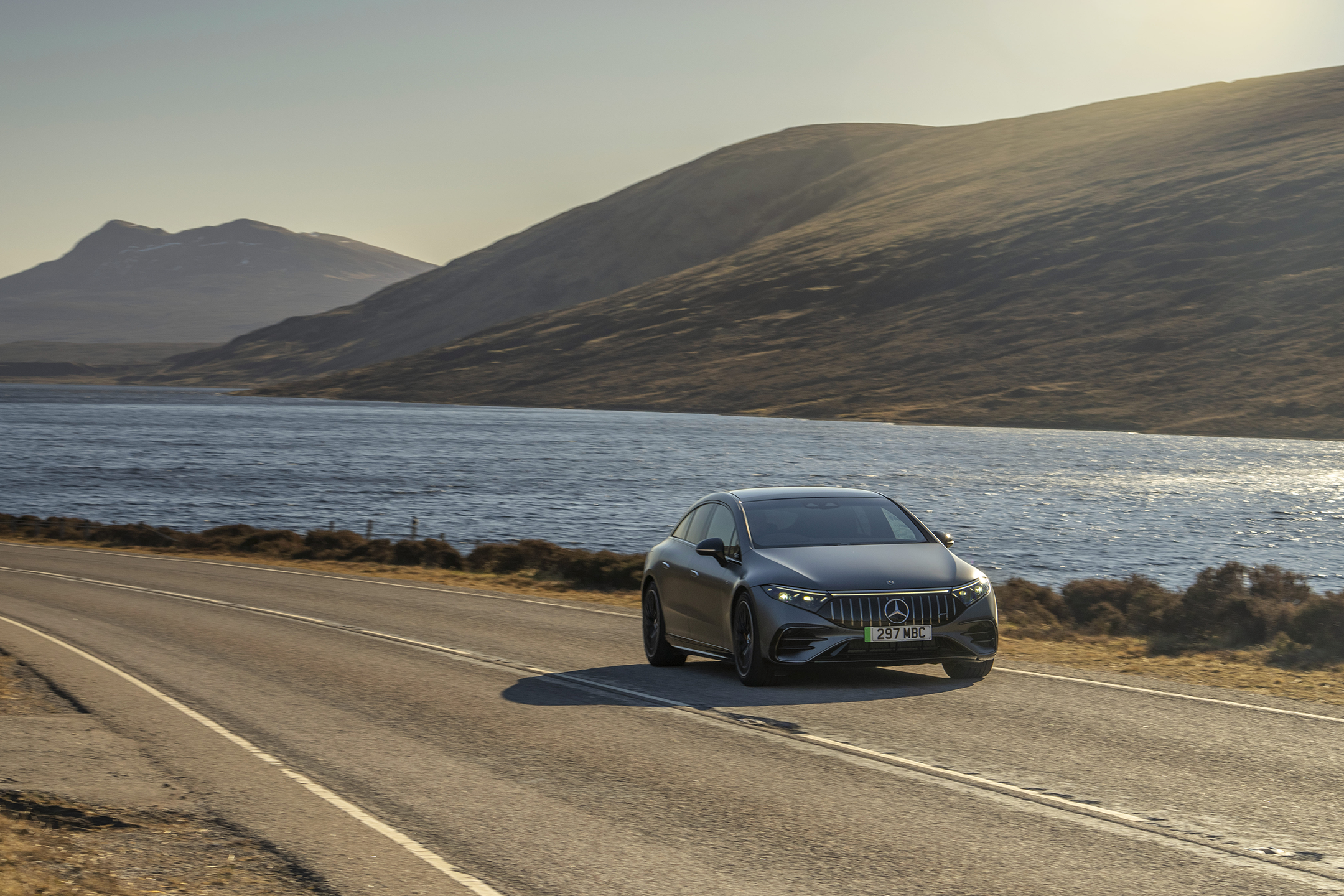
The Independent's Electric Vehicles Channel is sponsored by E.ON Next.
You might be surprised to learn how far today’s electric cars can go on a single charge. In fact, when using the manufacturers’ official figures – as we have always done with miles per gallon for fuel efficiency – today’s EVs can go over 400 miles on a charge.
In fact, every EV featured in this article has an official range of over 400 miles, and they come from a selection of manufacturers, including Mercedes, Polestar, Volkswagen, Tesla and Peugeot. These long ranges mean the equivalent of driving from London to Edinburgh is now possible – a drive that can take more than nine hours.
But before you embark on a trans-continental EV adventure, it’s worth remembering that the real-world range is often lower than what manufacturers claim – and lower than the figures produced by the WLTP test cycle, too. But driving between 250 and 300 miles on a single charge is now perfectly possible for many new EVs.
What’s more, not all of the cars featured here are luxury rides with six-figure price tags. While there are quite a few entries from premium German manufacturers, Tesla, Peugeot and Polestar all now prove EVs with over 400 miles of claimed range are falling within reach of more drivers than ever.
Instead of ranking our favourites, these EVs are listed in order of range, with the highest first. That way, you can see which car goes farthest, then decide whether you need every mile possible or if the perfect balance between range, price, size, comfort and performance can be struck.
How we tested
Every car featured in this article has been driven by an Independent motoring critic. These drives last for many miles and cover various types of roads, from town and city driving to sweeping country roads and motorways too.
We’ll borrow a car for several days to really get to grips with it, meaning we can put a manufacturer’s range claims to the test in the real world, completing hundreds of miles and keeping a watchful eye on how an EV’s range and efficiency are affected by road, driving style, ambient temperature and more.
This round-up features the electric cars with the longest range, as quoted by their manufacturers. These quoted ranges mostly come from the WLTP testing standard. But as you can see, a huge range isn’t always enough to earn an EV a great score from our experts. Our scoring takes into account all aspects of the car, from its value and quality, to its driving dynamics, practicality, performance and technology.
The best long-range EVs in 2025
- 481 miles – Mercedes-Benz EQS 450+: From £99,835, Mercedes-benz.co.uk
- 438 miles - Polestar 3 Long Range Single Motor: From £69,900, Polestar.com
- 436 miles – Volkswagen ID.7: From £51,550, Volkswagen.co.uk
- 436 miles – Tesla Model 3 Long Range Rear-Wheel Drive: From £44,990, Tesla.com
- 429 miles – Mercedes-Benz EQE 350+: From £69,105, Mercedes-benz.co.uk
- 422 miles – Peugeot e-3008: From £45,850, Peugeot.co.uk
Mercedes-Benz EQS 450+: From £99,835, Mercedes-benz.co.uk
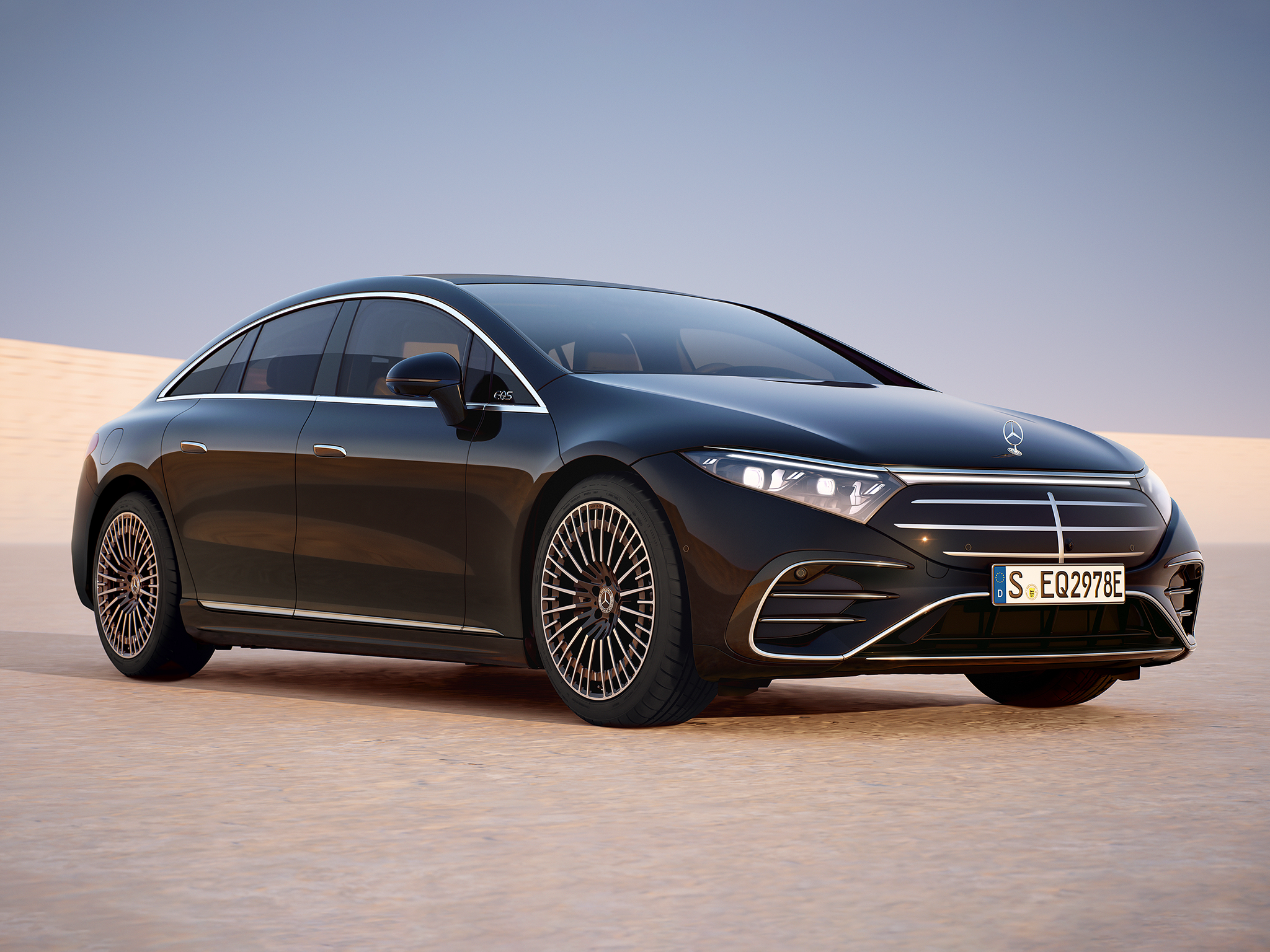
Independent rating: 6/10
- Pros: Huge range, very luxurious, onboard tech
- Cons: Huge price tag, fails to vie with an S-Class for luxury
- Price range: £99,835 to £161,860
- Battery size: 90.6kWh or 107.8kWh
- Maximum claimed range: 481 miles
- Miles per kWh: 3.6
- Maximum charging rate: 200kW
- Charging cost per 100 miles on E.ON Next Drive: £1.91
The Mercedes EQS is the current long-range EV champion, with a maximum claimed range of 481 miles. That’s enough stamina to drive from London to Edinburgh – a drive that often takes around eight hours – in a single charge, and with enough juice left to find a charger at your destination. At least that’s the claim; as ever with electric cars, speed and driving style, as well as ambient temperature and battery condition, all have an effect. Quite literally, your mileage may vary.
The EQE achieves this huge range thanks to its equally large 107.8 kWh battery, while a maximum charge rate of 200 kW means it’ll fill up from 10 to 80 percent in about an hour. That’s not as speedy as some cars with faster charging and smaller batteries, but an hour’s rest sounds quite appealing after 300 or 400 miles on the road.
Read our full Mercedes EQS review
All that said, while the EQS is a range champion, the rest of the car isn’t perfect. It’s packed with tech, but we found it isn’t quite in the same league as the internally-combusted Mercedes S-Class, which betters its electric sibling in terms of overall quality, rear seat comfort and passenger isolation from the outside world. We also think the MBW i7 is a more convincing electric luxury saloon, even if it can’t match the flagship Mercedes EV on range alone.
Polestar 3 Long Range Single Motor: From £69,900, Polestar.com
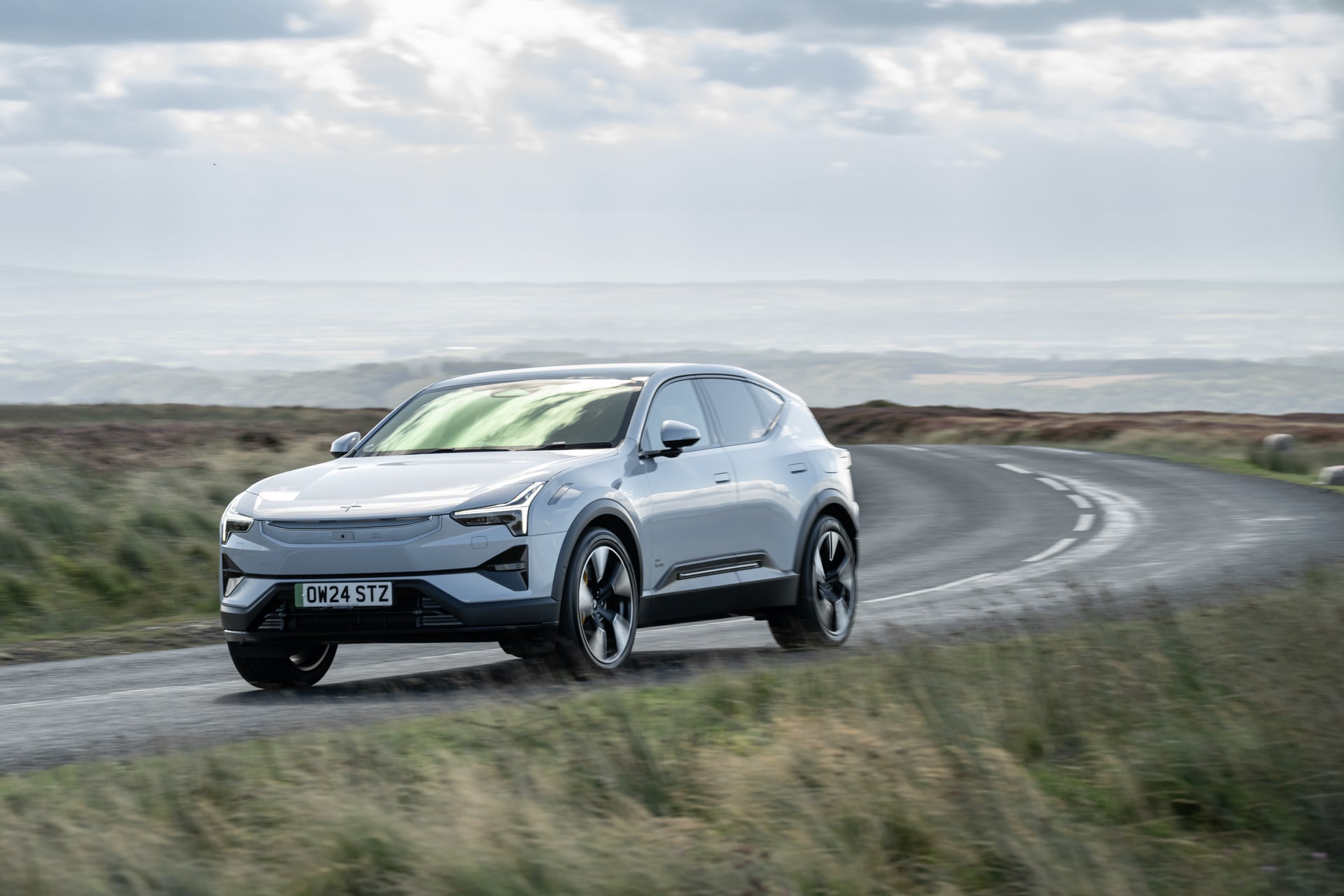
Independent rating: 8/10
- Pros: Fun to drive, rides well, spacious interior, lots of kit fitted as standard
- Cons: Lack of physical controls can be annoying, no seven-seat option
- Price range: £69,900 to £81,900
- Battery size: 111 kWh
- Maximum claimed range: 438 miles
- Miles per kWh: 3.3
- Maximum charging rate: 250 kW
- Charging cost per 100 miles on E.ON Next Drive: £2.03
The new single-motor variant of the Polestar 3 can travel a claimed 438 miles on a charge, giving it the second-longest range of any EV on sale in the UK today. It has the same big, 111 kWh battery as its dual-motor siblings, but makes do with less power (although still an adequate 295 bhp, plus a 0-62 mph time of 7.8 seconds).
Read our full Polestar 3 review
All three variants of the Polestar 3 have an impressive maximum charge rate of 250 kW, and when connected to an equally powerful charge they’ll fill from 10 to 80 percent in 30 minutes, or from zero to full in 11 hours using a home charger.
Inside, the Polestar’s minimalism interior features a 14.5-inch touchscreen that runs Google’s Android Automotive system, complete with integrated Google Maps and Google Assistant, plus Spotify too. The Polestar 3’s sound system is one of the best we have ever experienced, thanks to its compatibility with Dolby Atmos surround sound.
Volkswagen ID.7 Pro S Match: From £51,550, Volkswagen.co.uk

Independent rating: 8/10
- Pros: Long range, smooth ride, loads of space
- Cons: Dull looks, infotainment not great
- Price range: £51,550 to £61,980
- Battery size: 77kWh to 86kWh
- Maximum claimed range: 436 miles
- Miles per kWh: 4.54
- Maximum charging rate: 175kW
- Charging cost per 100 miles on E.ON Next Drive: £1.82
It might not have the outright longest range of any EV on sale today, but the Volkswagen ID.7’s claimed 436 miles of range earns it second place – and, more importantly, it scores 8/10 compared to the 6/10 for the longed-legged Mercedes EQS.
We think this is the best EV Volkswagen currently makes. It isn’t quite a rival for the Tesla Model 3, mostly because of the price, but in many ways the VW feels like a miniature Mercedes, given the comfort on offer.
Read our full Volkswagen ID.7 review
The ID. 7 is also a clear indication that Volkswagen – at last – is on the right path when it comes to EVs. It may be dull to look at, but its talents are thankfully more than skin deep.
There are two other areas where the ID. 7 really stands out, as well as the range, and they both come under the heading of comfort. There is loads of space in the back seats, while the ride is truly limo-like – it feels more like a Mercedes than many Mercedes models do these days.
The tech count is good, too, but one area VW still falls behind is on the usability of its touchscreen – even in the ID. 7 it’s still not good enough.
Tesla Model 3 Long Range Rear-Wheel Drive: From £44,990, Tesla.com
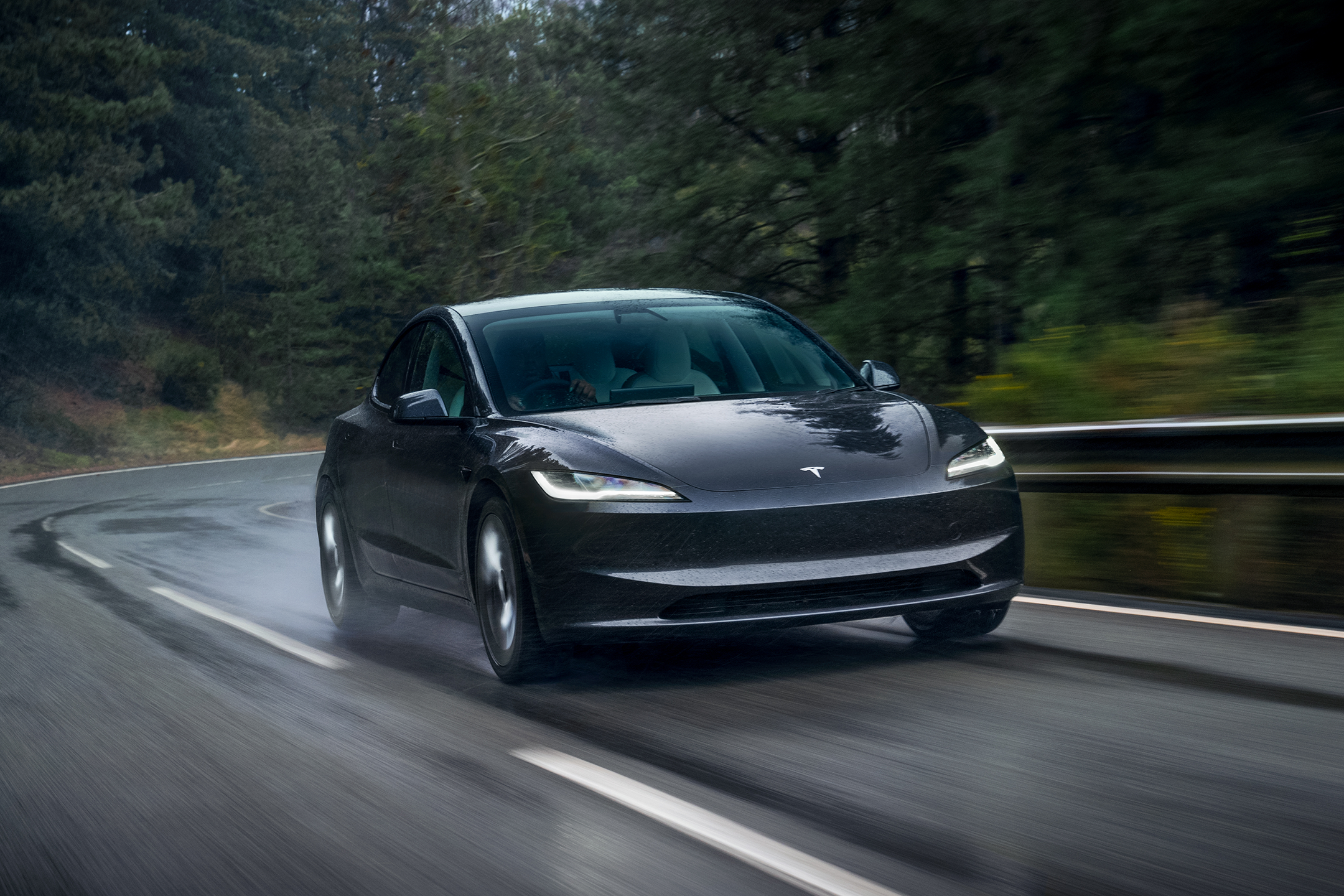
Independent rating: 10/10
- Pros: Brilliant tech, good to drive, efficient, Supercharger Network
- Cons: No Apple CarPlay
- Price range: £39,990 to £59,990
- Battery size: 60 - 75 kWh (usable)
- Maximum claimed range: 436 miles
- Miles per kWh: 4.7
- Maximum charging rate: 170 kW
- Charging cost per 100 miles on E.ON Next Drive: £1.47
The Tesla Model 3 might just be the best electric car on sale in the UK today. And now, thanks to a new variant launching8 October 2024, it now has one of the longest ranges of any EV too.
The Model 3 gained a new member in October, in the form of the Long Range Rear-Wheel Drive, which slots between the entry-level car (rear-drive, smaller battery) and the pre-existing long-range variant with all-wheel-drive. By combing the bigger battery with the less powerful single-motor drivetrain, Tesla now offers a Model 3 capable of a claimed 436 miles on a charge, which ties for second place in our long-range league table.
Read our full Tesla Model 3 review
The Model 3 also charges quickly, at up to 170 kW, and of course it has access to the fantastic Supercharger network, which provides a fast, reliable charging service – and often at a cheaper rate than other networks. It’s a brilliant package, especially when you factor in the Model 3’s tech features, efficiency and the spacious five-seat cabin.
Negatives? We wish Tesla wouldn’t fit illogical steering wheel buttons instead of stalks for the indicators and wipers, but that’s really about it. Learn your way around those inconveniences, and the Model 3 is a superb electric car – and now it has a huge range, too.
Mercedes-Benz EQE 350+: From £69,105, Mercedes-benz.co.uk
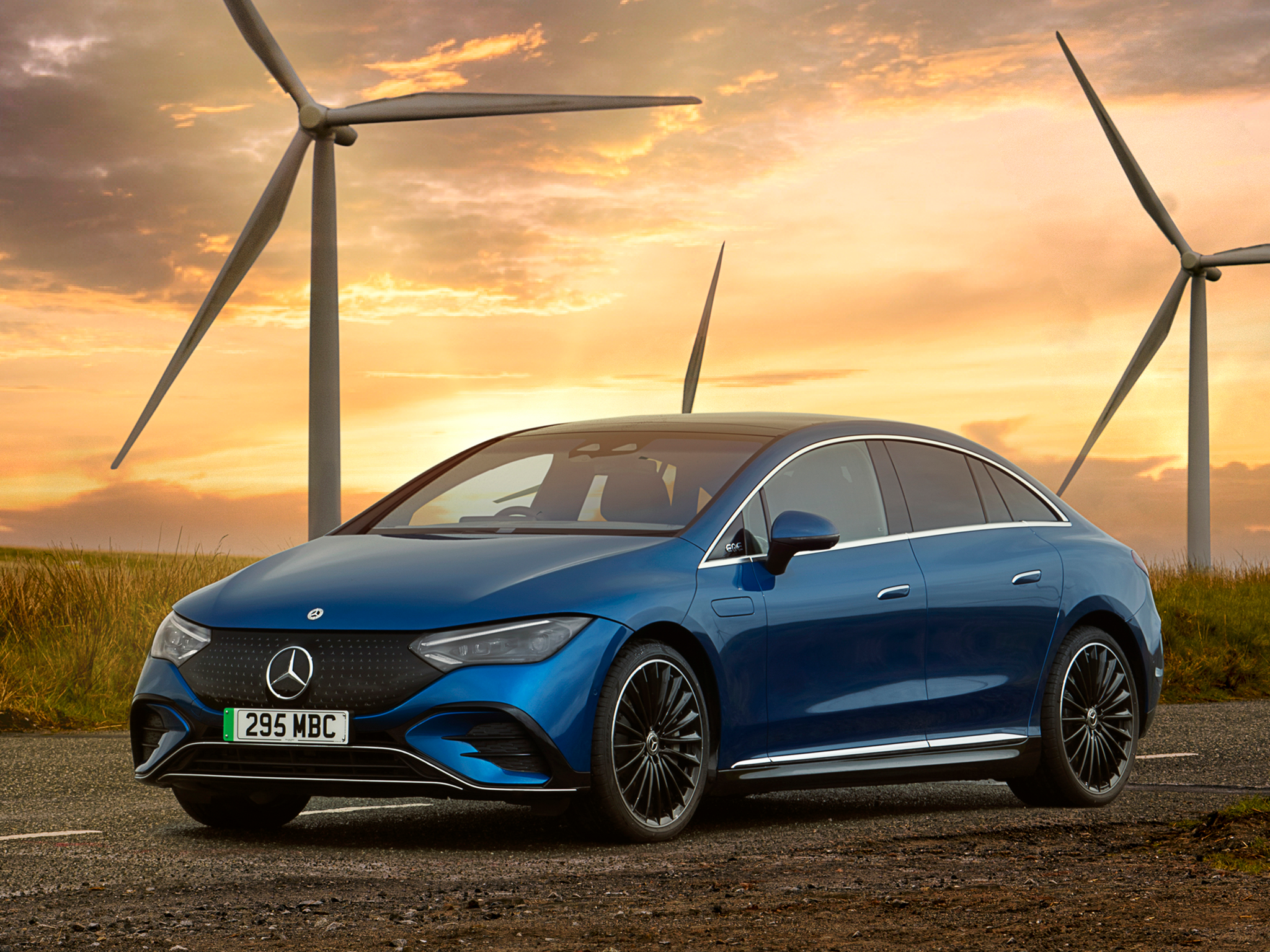
Independent rating: 8/10
- Pros: Superb range, excellent long-distance comfort, high-tech interior
- Cons: Futuristic appearance is too much for some, practicality could be better, quickly gets expensive
- Price range: £69,105 to £115,860
- Battery size: 90 kWh
- Maximum claimed range: 429 miles
- Miles per kWh: 3.8
- Maximum charging rate: 170 kW
- Charging cost per 100 miles on E.ON Next Drive: £1.82
A sleek and modern-looking EV saloon with a huge range of over 400 miles and strong efficiency, the Mercedes EQE goes further than many of its key rivals. The EQE backs this up with excellent long-distance comfort and a high-tech interior that feels as futuristic as the car looks.
We’ve spent a lot of time in the EQE and covered many extra-long motorways journeys to put the large, 96kWh battery to the test, and we’ve never been disappointed. The clever infotainment is also particularly impressive, thanks to its connectivity and ‘self-learning’ personalisation features, and the top-spec Burmester stereo impresses too.
Read our full Mercedes EQE review
Add similar such extra features though, and the Mercedes EQE can quickly get expensive. We’re also put off a little by how the sleek roofline eats into rear headroom, the small boot and a few areas of sub-optimal quality inside the cabin. Overall though, this is an impressive electric executive saloon with a fantastic range and lots of tech.
Peugeot e-3008: From £45,850, Peugeot.co.uk
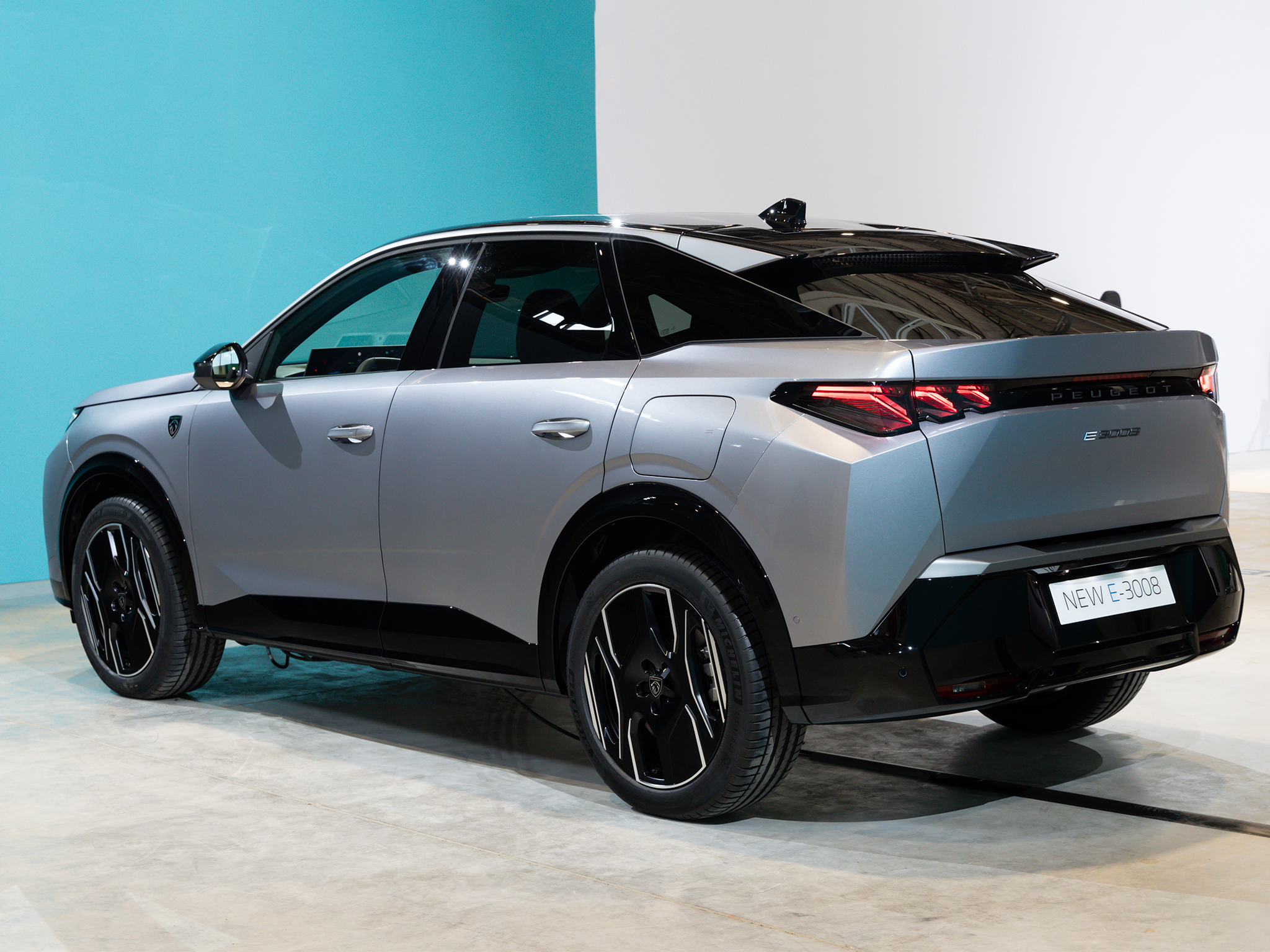
Independent rating: 8/10
- Pros: Design excellence, svelte interior, superb range
- Cons: Rear seat space could be better, heat pump is optional
- Price range: £45,850 to £52,350
- Battery size: 73kWh, 98kWh
- Maximum claimed range: 327 to 422 miles
- Miles per kWh: 3.1
- Maximum charging rate: 170 kW
- Charging cost per 100 miles on E.ON Next Drive: £2.16
Peugeot is proof that not all long-legged EVs are expensive executive saloons from Germany. The e-3008 starts at about £45,000 and has a range of up to 422 miles if you opt for the larger 98 kWh battery pack due out in early 2025. Even the regular batter, with its 73 kWh capacity and 327 miles of range, is impressive for the price.
Pair all that with a fast maximum charge rate of 170 kW, and you can see why the stylish family SUV is a firm favourite among our team of roadtesters. The Peugeot also wows with a first-rate interior that has a design even more distinctive than the exterior, and it has plenty of onboard tech too.
Read our full Peugeot e-3008 review
Another plus point is how the battery can be charged from 20 to 80 percent in as little as 30 minutes from a high-speed public charger, and that the e-3008 feels comfortable and safe on the road, thanks to plenty of driver assistance tech working in the background.
Our only major gripe is how a heat pump, which helps save battery energy in cold weather, isn’t standard and instead costs an extra £700. We would also like to see a bit more space in the rear seats.
Porsche Taycan: From £86,500, Porsche.com
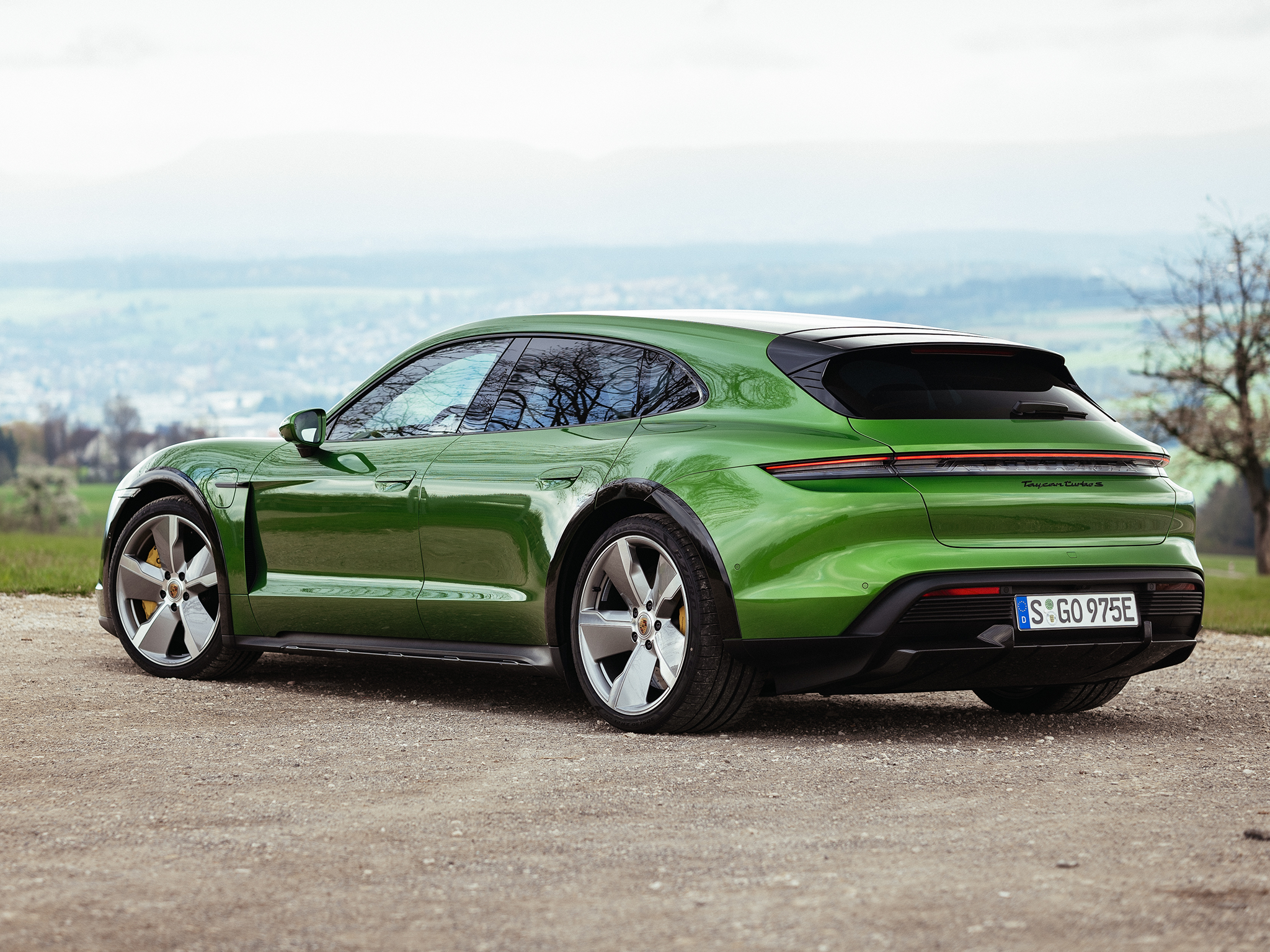
Independent rating: 9/10
- Pros: Extremely fast charging, good range, outrageous performance in Turbo S guise
- Cons: Expensive optional extras, cramped back seats, depreciation
- Price range: £86,500 to £186,300
- Battery size: 89kWh to 105 kWh
- Maximum claimed range: 360 to 421 miles
- Miles per kWh: Up to 3.72
- Maximum charging rate: 320 kW
- Charging cost per 100 miles on E.ON Next Drive: £1.85
Porsche’s first electric car, the Taycan, came out of the blocks like a rocketship back in 2019, but in the half-decade since its maximum range was overtaken by much of the competition. Not so any more, as a facelift revealed in 2024 brought more power, quicker charging and, most importantly, a lot more range.
In its most long-legged guise the Taycan now has a claimed range of some 421 miles. It also charges more quickly than just about any other car on sale, with a maximum rate of 320kW. Find a powerful enough charger and the Taycan will fill its huge, 105kWh battery from 10 to 80 percent in just 18 minutes.
Read our full Porsche Taycan review
We also love the way the Taycan looks and how it still drives like a Porsche, despite the lack of an engine. The two-speed gearbox gives it more character than the single-gear transmissions of other EVs, and new for this model is a trick suspension system. Called Porsche Active Ride, it leans into corners and tilts the car forwards slightly when accelerating, then backwards during braking to help keep it perfectly level. It’s witchcraft, but it works.
If you want maximum performance, the Turbo GT variant has a range closer to 350 miles, but manages to launch itself to 62 mph in just 2.2 seconds.
Peugeot e-5008: From £48,495, Peugeot.co.uk
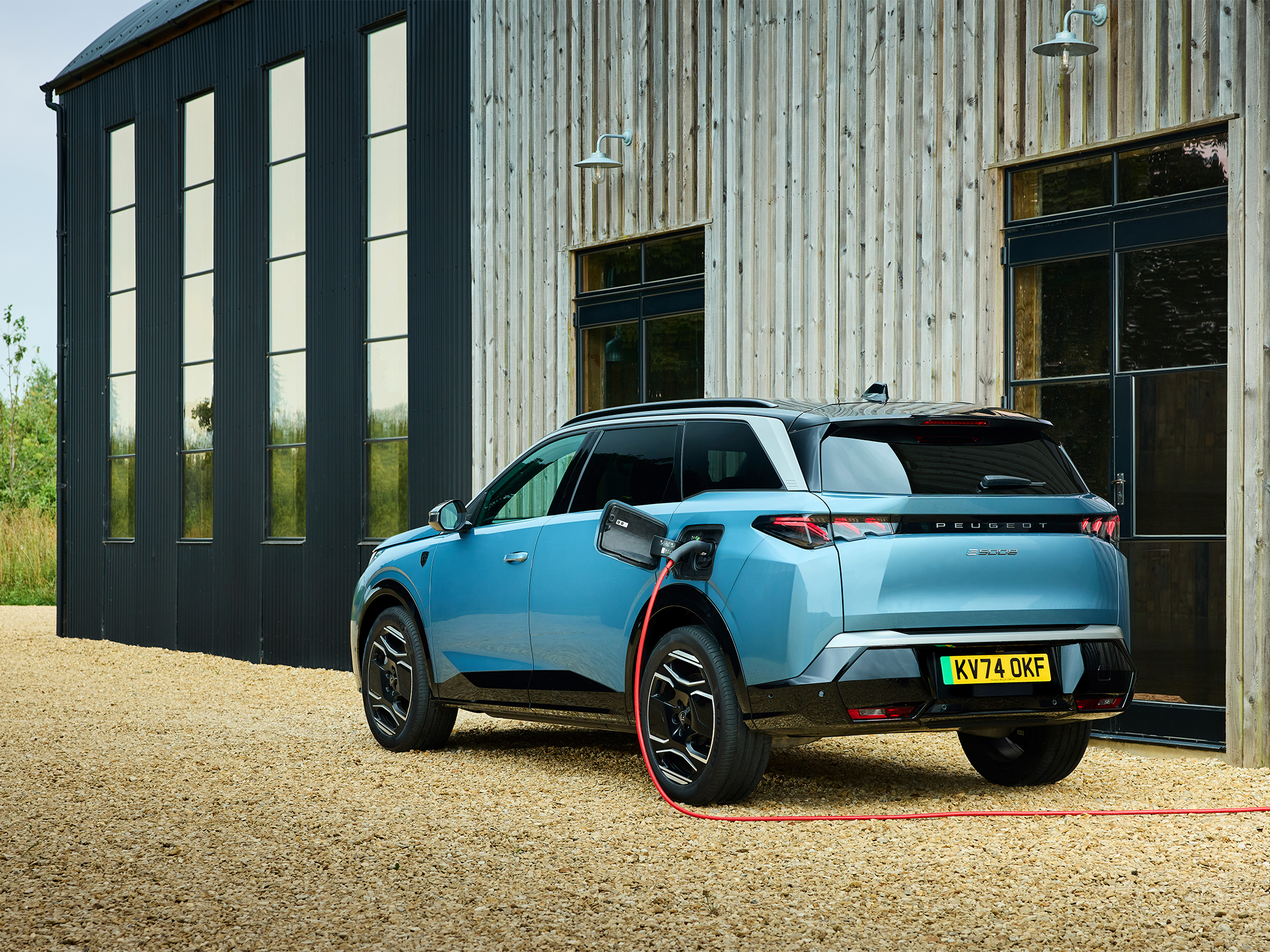
Independent rating: 8/10
- Pros: Seven seats, great range, lots of kit as standard
- Cons: Lacks driving engagement, bigger battery coming later, pricey compared to the hybrid
- Price range: £48,495 to £52,295
- Battery size: 73kWh (96kWH coming later)
- Maximum claimed range: 410 miles
- Miles per kWh: 3.9
- Maximum charging rate: 160kW
- Charging cost per 100 miles on E.ON Next Drive: £1.77
It’s Peugeot again, and this time not only do we have an EV with a massive range, but it’s a seven-seater too, making it a pretty rare thing. We were greatly impressed by the e-5008 when we drove it, thanks to its stylish design and interesting yet high-quality interior that felt spacious across all three rows, yet without the car seeming massive to drive.
For now the car can only be bought with the smaller 73kWh battery, which is good for about 310 miles. But soon the bigger 96kWh model will be available and – although it takes the car up to a rather un-Peugeot-like £52,000 – that’ll be the one with over 400 miles of range.
Read our full Peugeot e-5008 review
We also like how the car charges fairly quickly, with a maximum rate of 160kW, and how it comes with a lot of kit as standard. It’s an easy car to use, despite the slightly funky interior design, and we can see it slotting neatly into the lives of a great many families who need more than five seats.
It’s pricey for a Peugeot, and especially compared to the hybrid version of the 5008. But if a long-range EV with seven seats is what you need, this is undoubtedly the car to buy.
Polestar 2: From £44,950, Polestar.com
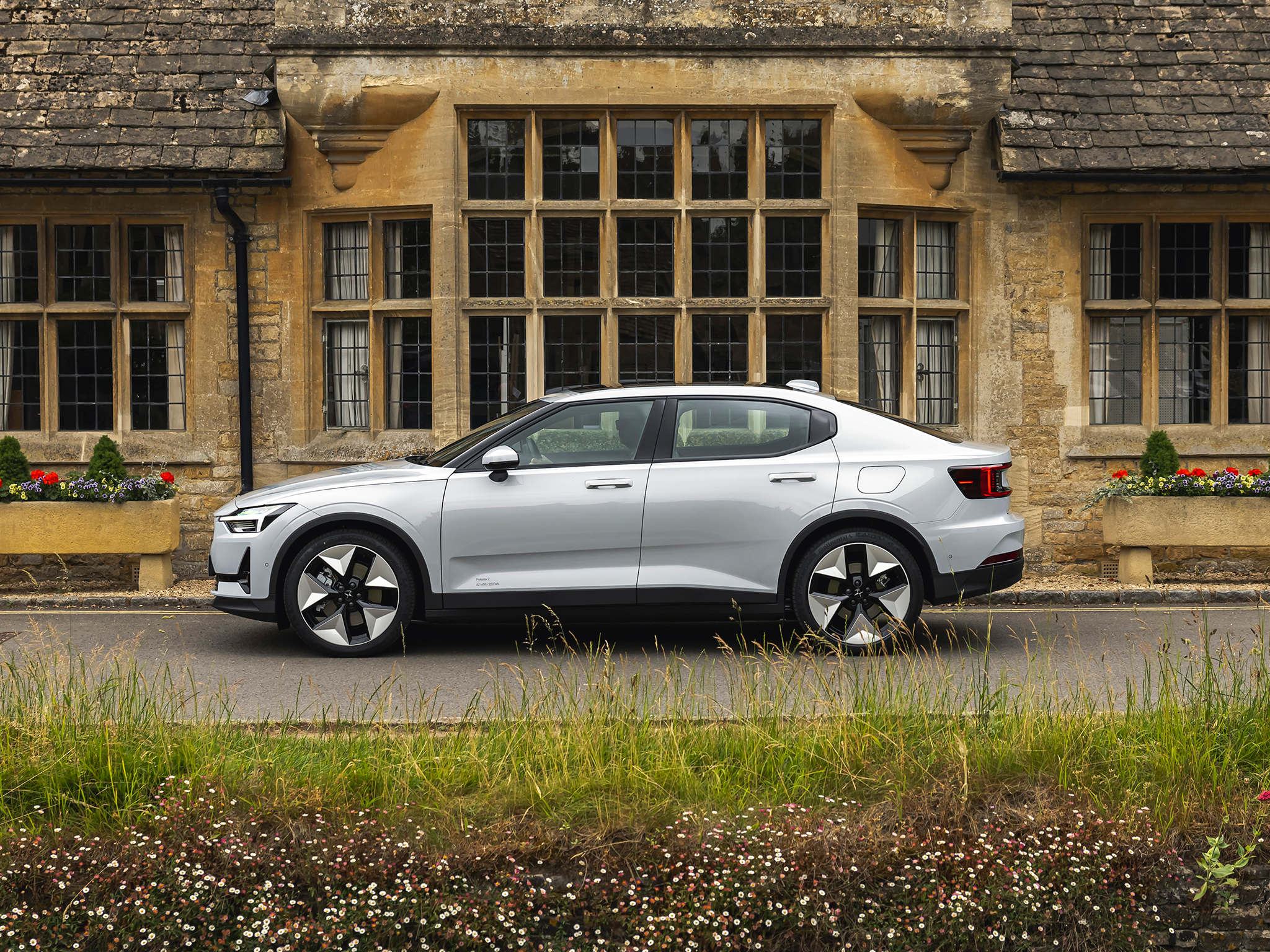
Independent rating: 7/10
- Pros: Strong range and efficiency, Android infotainment, occasional manufacturer discounts
- Cons: Firm ride, can get expensive, limited rear head room
- Price range: £44,950 to £57,950
- Battery size: 69 to 82kWh
- Maximum claimed range: 406 miles
- Miles per kWh: 4.2
- Maximum charging rate: 205 kW
- Charging cost per 100 miles on E.ON Next Drive: £1.64
Just like the Porsche Taycan, the Polestar 2 is another EV that arrived several years ago and received a mid-life facelift that bumped up the range. In this case we’re talking a claimed 406 miles from the Swedish EV (when you spec the larger 82kWh battery pack) and a maximum charge rate of 205kW.
That isn’t quite on par with some rivals, but it’s still pretty quick and means the battery can fill from 10 to 80 percent in as little as 28 minutes.
Read our full Polestar 2 review
As well as the big range, we also like the Polestar 2 for its classy styling, engaging drive and infotainment system. The car runs Android Automotive, which means there’s native support for Google Maps (which knows how much battery you have left and where charge stations are), Google Assistant, the Play store and Spotify. Apple CarPlay is also there for iPhone users, and the rest of the user interface is among the best we’ve used in any EV to date.
Polestar 3: From £69,900, Polestar.com
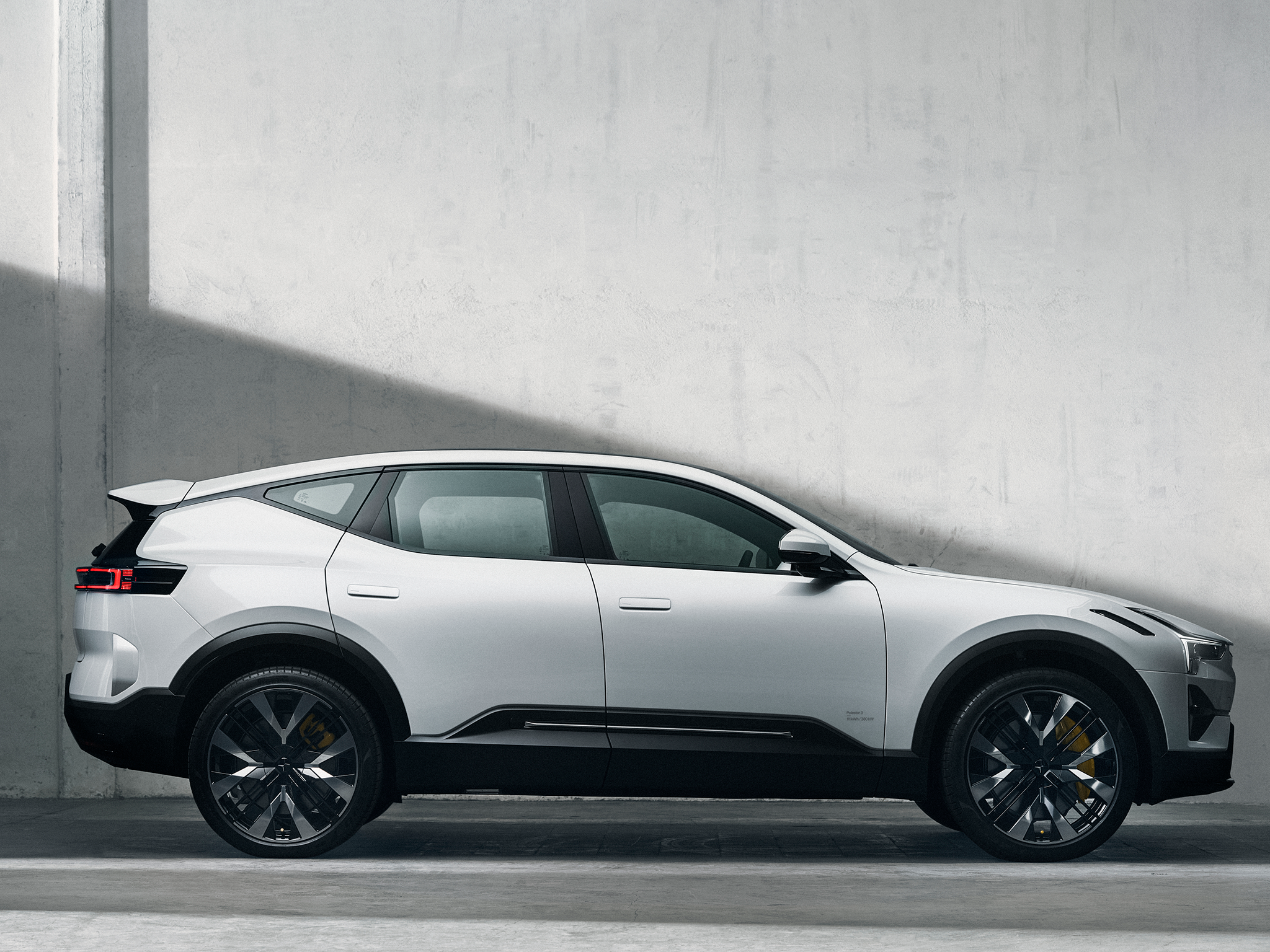
Independent rating: 8/10
- Pros: Fun to drive, spacious interior, lots of kit fitted as standard
- Cons: Lack of physical controls can be annoying, no seven-seat option, performance pack is unnecessary
- Price range: £69,900 to £81,900
- Battery size: 111kWh
- Maximum claimed range: 403 miles
- Miles per kWh: 3.3
- Maximum charging rate: 250kW
- Charging cost per 100 miles on E.ON Next Drive: £2.09
Polestar’s first full-size SUV, the 3 shares its underpinnings with the new Volvo EX90, which means the same huge battery capacity of 111 kWh. For the Polestar that translates into a claimed range of 403 miles, although naturally that will vary depending on how the car is driven and the ambient temperature.
Read our full Polestar 3 review
As with other Polestars, the 3 offers a sporty drive that will please keen drivers but results in a firmer ride than some buyers might expect from a plush SUV. The dual-motor variant is properly quick, but our pick of the bunch is the single-motor car, since it has the longest range and still offers plenty of performance.
Like the Polestar 2, the 3 benefits from a clean and tidy infotainment system built on Google’s Android Automotive. We like how Google Maps and Google Assistant are both tightly integrated, but the 3’s lack of physical mirror controls is a pain, since you have to dive into the touchscreen instead. Regardless, this is a stylish, high-quality SUV that drives well, has loads of space in the cabin (although it’s not available as a seven-seater) and a huge range.
Mercedes-Benz EQS SUV: From £130,000, Mercedes-benz.co.uk
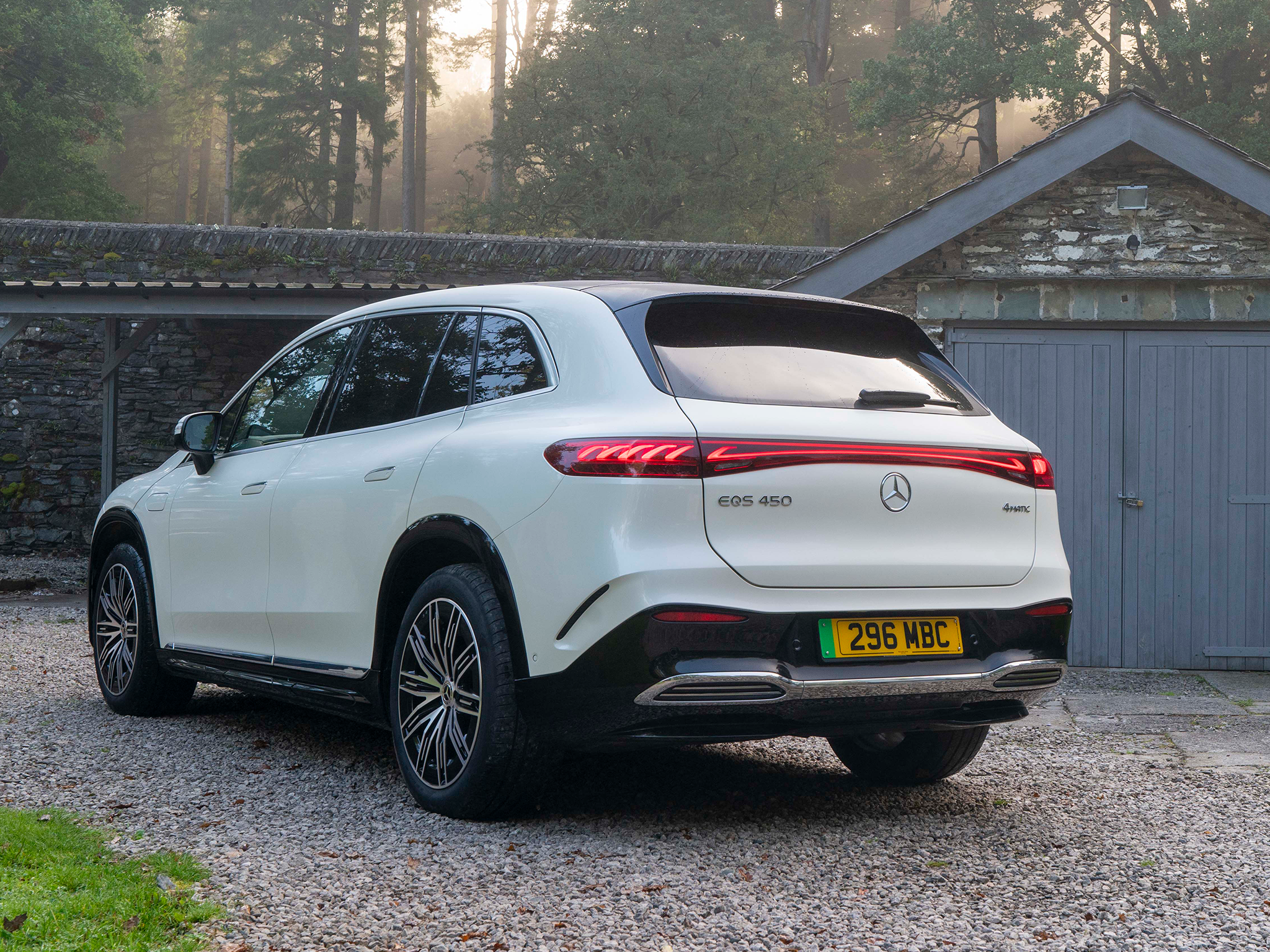
Independent rating: 6/10
- Pros: Ultra-luxurious interior, fantastic range, sheer refinement
- Cons: Expensive, soft suspension, sheer size
- Price range: £130,000 to £144,000
- Battery size: 118kWh
- Maximum claimed range: 401 miles
- Miles per kWh: 3.0
- Maximum charging rate: 200kW
- Charging cost per 100 miles on E.ON Next Drive: £2.30
The Mercedes EQS SUV is an ultra-luxurious EV with a fantastic range and almost unrivalled refinement. However, it is expensive and very large for UK roads.
It should come as no surprise that this car has a big range, given the massive 118 kWh battery pack lurking in its floor. It also charges quickly too, thanks to a maximum rate of 200 kW, and Mercedes’ onboard tech is among the best.
Read our full Mercedes EQS SUV review
That said, we cannot stress enough quite how big this car is. At over five metres long and two metres wide, it is simply too large for some UK roads – watch out for those London width restrictors, and good look in a multi-storey car park. It’s also extremely heavy, at almost 3.1 tonnes (not a typo), and this does take the edge off both its straight-line performance and drive dynamics.
If luxury is what you want though, and you’re confident it’ll fit into your life (if not necessarily your garage), then in terms of luxury there’s little that can beat it.
Porsche Macan: From £67,200, Porsche.com
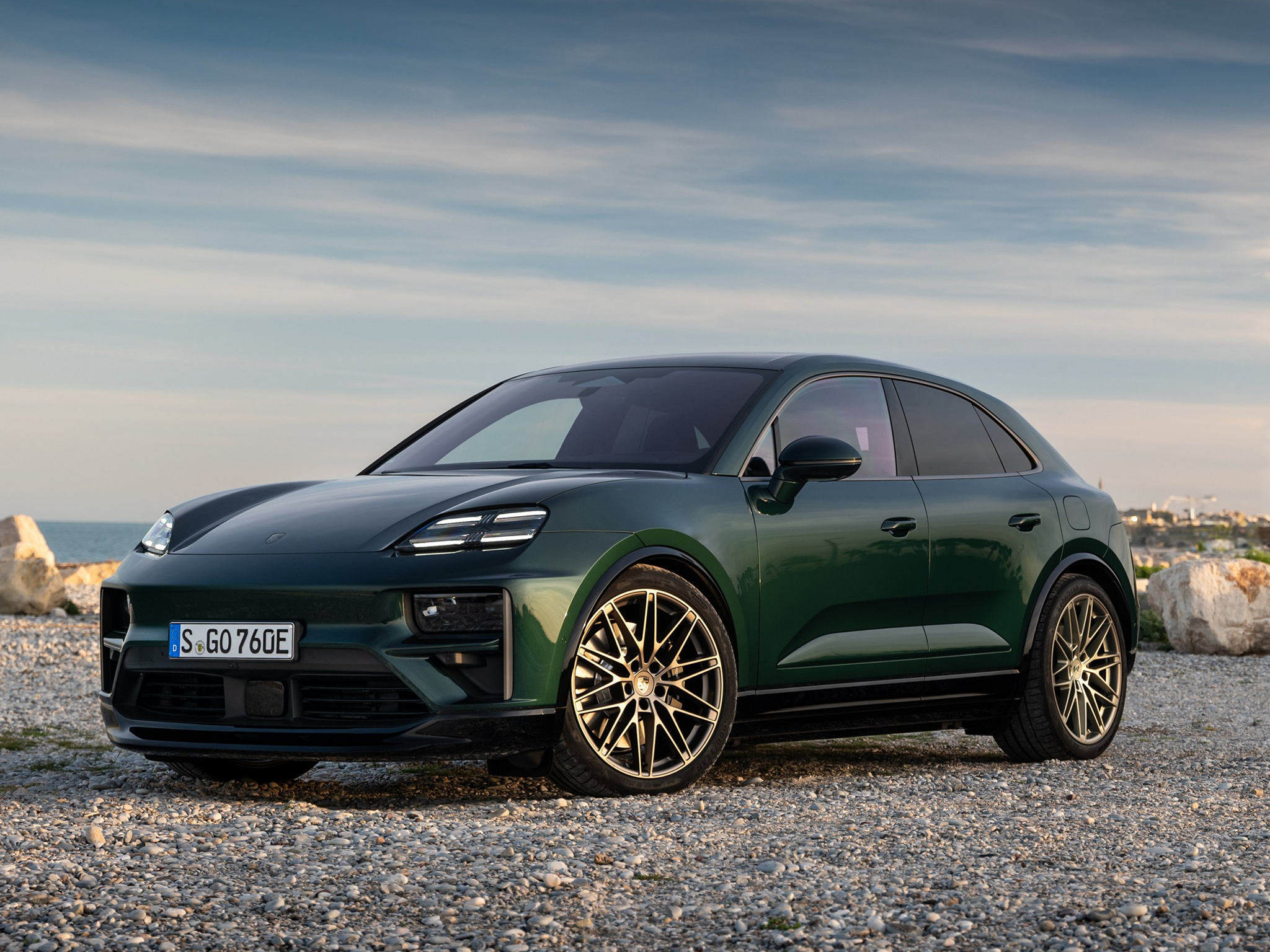
Independent rating: 8/10
- Pros: Enjoyable to drive, fast charging, great interior ergonomics
- Cons: Rear seat space is marginal, options quickly get expensive, turbo is overkill for most
- Price range: £67,200 to £95,000
- Battery size: 100 kWh
- Maximum claimed range: 398 miles
- Miles per kWh: 2.9 to 3.6
- Maximum charging rate: 270 kW
- Charging cost per 100 miles on E.ON Next Drive: £1.89
Porsche’s second all-electric car, the Macan is a mid-size SUV with the sporty eagerness and sense of quality you’d expect from the German brand. It has a big battery, charges very quickly and promises decent energy efficiency for a claimed range of almost 400 miles. Be aware though, that stat is for the least powerful, entry-level car with a single motor. It’s still a pleasant thing to drive, hitting 62 mph in 5.7 seconds, but trades typical Porsche performance for its long range.
There are three other Macan models to pick from (with more likely still to come), but while these offer more power – much more in Turbo guise – they cannot match the base model’s range.
Read our full Porsche Macan review
All versions of the Macan benefit from a high-quality interior with a lovely driving position, high-quality switchgear and a sense that Porsche has really thought about how its cars should operate. The infotainment system works well and we’re big fans of the physical switches for adjusting the cabin temperature and fan speed, instead of a touchscreen.
If you want a high-quality electric SUV that isn’t too massive, yet drives with poise and precision, doesn’t intimidate by trying to seem too futuristic, and has a great range, the Macan is hard to ignore.
Verdict: Best long-range electric cars
It might come as a surprise to potential EV buyers that today’s cars can travel over 400 miles on a charge. It feels like no time at all since 200 miles was a real achievement, but double that is now possible. At least in theory.
The ranges quoted by manufacturers tend to use the WLTP testing standard. While they’re a handy way to compare one car with another (like how you can compare the miles per gallon of two petrol cars), an EV’s ability to actually hit that range will depend on many factors. These include how the car is driven and what the roads are like. Ambient temperature is a major factor too, since colder weather has a negative effect on battery life.
With that in mind, the longest-range EV you can buy today (in September 2024), is the Mercedes EQS, with a whopping claimed range of 481 miles. But it’s the Volkswagen ID.7, which has a claimed range of 436 miles, that scores more highly in our books. It’s the best electric car Volkswagen makes right now, and at £51,550 it’s significantly cheaper than the Mercedes.
Long-range electric car FAQs
Can electric cars really go as far as they claim?
It’s best to look at the claimed range (or efficiency) of an electric car as you do the MPG figure of a petrol of diesel vehicle. In both cases, these figures are calculated using strict testing protocols which aim to replicate real-world usage, but can’t account for every eventuality. Instead, they are best used to compare one car with another.
In our experience, we have sometimes beaten the claimed efficiency when driving an EV at a moderate, steady speed, but seen lower efficiency figures when driving at higher speeds for long periods of time. So, while some EVs can indeed travel for between 300 and 400 miles between charges, they can’t all hit their claimed maximum range when driven at a steady 70 mph for hours on end.
Is electric car range affected by cold weather?
Yes. Just like the lithium-ion batteries of your smartphone, laptop and camera, the battery packs of electric cars perform less well when they are cold. To help mitigate against this, it is always best to pre-heat your EV while it’s still plugged into the charger at home. That way, the battery and cabin will be warm before you set off; this will make you more comfortable and increase the efficiency of the battery during the first few miles, so it doesn’t have to use its own energy reserves to warm up.
How to increase electric car range
If you’re worried about the range of your EV, there are a few things you can do to help eke a few more miles out of the battery. Lowering your speed can make the most difference, along with switching the car to its least powerful mode, often called Eco. This makes the accelerator pedal less responsive and helps you use less energy, and also often reduces the power of the air conditioning system. On that note, some EVs have a driver-only mode for the climate control, where only your side of the cabin is heated or cooled when you’re the only occupant.
Does wheel size affect electric car range?
Yes. Larger wheels can have a negative affect on maximum range, but usually only by a handful of miles. Sometimes manufacturers even state a different maximum range for two cars that are identical, except for the size of their wheels.









Join our commenting forum
Join thought-provoking conversations, follow other Independent readers and see their replies
Comments